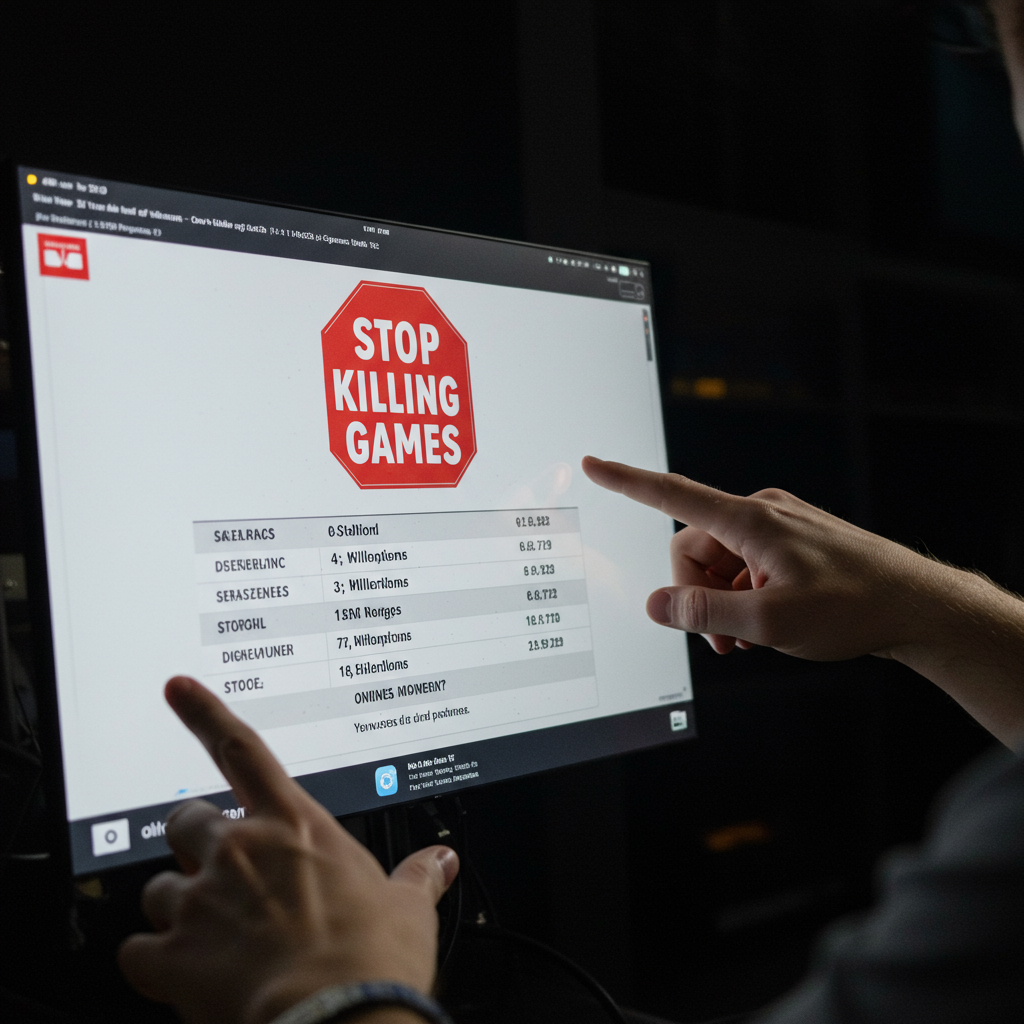The digital age of gaming has ushered in convenience, but it also presents complex challenges, particularly regarding game ownership and preservation. A critical campaign is highlighting these issues, gaining significant traction across Europe.
The “Stop Killing games” petition, ignited by Ubisoft’s controversial shutdown of the always-online racing game The Crew, is on the cusp of a major milestone. This international consumer rights initiative seeks to protect players from losing access to purchased digital games when publishers decide to take online services offline. It argues that shutting down games consumers have bought effectively destroys a purchased item, a practice rarely seen in other industries.
Why the Stop Killing Games Campaign Matters
The catalyst for this growing movement was the deactivation of The Crew in March 2024. Despite players having purchased the game, its reliance on a persistent online connection meant that when Ubisoft shut down the servers, the game became completely unplayable. This action stripped players of their ability to access content they had paid for, sparking widespread outrage among the gaming community.
This incident underscored a critical vulnerability in the current digital ownership model for many games. Unlike physical copies, which can often be played offline indefinitely, always-online titles remain beholden to publisher-controlled servers. When those servers go dark, the game effectively ceases to exist for the end-user, transforming a purchase into a temporary lease dependent on corporate will.
The Petition’s Core Objective
At its heart, the Stop Killing Games initiative is a push for legislative change. The campaign specifically targets lawmakers within the European Union. Its primary goal is to compel publishers who sell or license video games within the EU to ensure those games remain functional and playable for consumers even after official online support ends. This could mean requiring companies to provide offline modes, server emulation tools, or other means of continued access.
The movement believes that current consumer protection laws are ill-equipped to handle the nuances of digital game licensing and shutdowns. By classifying a game purchase as a mere license, publishers can argue that consumers never truly “owned” the software, thereby sidestepping traditional protections that would apply to physical goods. The petition aims to close this perceived legal loophole and solidify consumer rights in the digital realm.
The Push Towards One Million Signatures
To bring this urgent issue before the European Commission, the Stop Killing Games petition set an ambitious goal: securing one million signatures from EU citizens. Reaching this threshold is a crucial step to formally trigger consideration for potential new legislation.
The campaign has seen remarkable support over the past year. Fuelled by the ongoing conversation around game preservation, digital rights, and high-profile game shutdowns beyond just The Crew, the petition has steadily climbed towards its target.
As of recent reports, the petition has surpassed 950,000 signatures. This represents over 95% of the initial one million goal, demonstrating the widespread concern among European gamers and consumers regarding the future of digital game access. This significant progress highlights the community’s determination to hold publishers accountable and protect digital purchases.
The Real Target: Accounting for Verification
While reaching one million signatures is the official target to get the petition in front of the European Commission, the organizers understand the practical realities of such a large-scale effort. The EU process involves a rigorous verification of each signature to ensure it comes from an eligible EU citizen and is not duplicated or fraudulent.
Anticipating that a percentage of the collected signatures will inevitably be invalidated during this verification process, the Stop Killing Games organizers have issued a crucial update. They now estimate the campaign needs to collect significantly more than one million signatures to ensure that at least one million verifiable signatures remain.
The new, more realistic target is reportedly between 1.2 to 1.3 million signatures. This means that despite being close to the initial headline goal, there remains a critical need for continued support to build a sufficient buffer against invalidations. The deadline for reaching this crucial number is fast approaching: July 31. This adds a significant sense of urgency to the final push for signatures.
Broader Implications for Game Preservation and Ownership
The attention garnered by the Stop Killing Games petition reflects a broader, growing awareness of video game preservation challenges. As the industry increasingly shifts towards digital-only releases and online-dependent experiences, the risk of vast swathes of gaming history becoming inaccessible due to server shutdowns looms large.
This movement isn’t isolated to the EU. Similar consumer rights campaigns are emerging elsewhere. In the United Kingdom, for instance, a separate petition urging the government to update consumer law specifically to prohibit publishers from disabling video games has also gained substantial traction, collecting over 120,000 signatures. This level of support is significant enough to trigger a debate on the issue within the UK parliament, even after an initial unfavorable response from the government.
These parallel efforts in different regions signal a global concern regarding the future of digital entertainment. Players are increasingly questioning the value and permanence of their digital libraries when facing the risk of deactivation. The Stop Killing Games petition serves as a focal point for this debate, potentially paving the way for stronger consumer protections and a more secure future for digital game ownership and preservation. The outcome of this European campaign could set a precedent for digital rights discussions worldwide.
Frequently Asked Questions
What is the Stop Killing Games petition and its main goal?
The Stop Killing Games petition is an international consumer rights initiative launched after Ubisoft shut down The Crew, rendering it unplayable. Its main goal is to lobby for legislation, primarily in the EU, that would require publishers to ensure games remain functional for consumers even after online services end. This could involve mandatory offline modes or other preservation methods to protect digital purchases from being lost.
Why does the Stop Killing Games petition need over 1 million signatures?
The petition needs one million verifiable signatures from EU citizens to formally bring its demands before the European Commission for legislative consideration. However, due to the verification process which is expected to invalidate a number of signatures, the organizers are aiming for a higher target, ideally between 1.2 and 1.3 million signatures, to ensure the minimum requirement is met by the July 31 deadline.
What impact could the Stop Killing Games petition have on game ownership?
If successful, the Stop Killing Games petition could lead to new laws that redefine digital game ownership, offering stronger protections for consumers. It could compel publishers to change practices regarding always-online requirements or implement mandatory provisions for offline access or server availability for a reasonable period. This could solidify the concept that buying a digital game grants a lasting right to access it, similar to owning a physical copy, rather than a temporary license subject to publisher control.
Conclusion
The Stop Killing Games petition reaching 95% of its initial million-signature goal represents a powerful statement from consumers demanding better rights in the digital realm. Sparked by events like The Crew shutdown, this movement highlights the critical need for updated laws that address the unique challenges of digital game ownership and preservation. As the campaign enters its final, crucial phase, needing significantly more signatures by the July 31 deadline due to verification requirements, the stakes are high. Success could pave the way for landmark legislation in the EU, potentially influencing consumer protection standards for digital content globally and ensuring that purchased games remain playable for years to come. The fight for digital game preservation and true ownership is far from over, but this petition marks a vital turning point.



